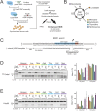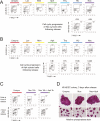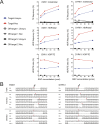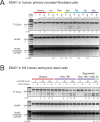Enhanced homology-directed human genome engineering by controlled timing of CRISPR/Cas9 delivery
- PMID: 25497837
- PMCID: PMC4383097
- DOI: 10.7554/eLife.04766
Enhanced homology-directed human genome engineering by controlled timing of CRISPR/Cas9 delivery
Abstract
The CRISPR/Cas9 system is a robust genome editing technology that works in human cells, animals and plants based on the RNA-programmed DNA cleaving activity of the Cas9 enzyme. Building on previous work (Jinek et al., 2013), we show here that new genetic information can be introduced site-specifically and with high efficiency by homology-directed repair (HDR) of Cas9-induced site-specific double-strand DNA breaks using timed delivery of Cas9-guide RNA ribonucleoprotein (RNP) complexes. Cas9 RNP-mediated HDR in HEK293T, human primary neonatal fibroblast and human embryonic stem cells was increased dramatically relative to experiments in unsynchronized cells, with rates of HDR up to 38% observed in HEK293T cells. Sequencing of on- and potential off-target sites showed that editing occurred with high fidelity, while cell mortality was minimized. This approach provides a simple and highly effective strategy for enhancing site-specific genome engineering in both transformed and primary human cells.
Keywords: CRISPR/Cas9; cell biology; cell cycle synchronization; chromosomes; genes; genome engineering; homologous recombination; human; nocodazole; non-homologous end joining.
Conflict of interest statement
The authors declare that no competing interests exist.
Figures






References
-
- Adams RL, Lindsay JG. Hydroxyurea reversal of inhibition and use as a cell-synchronizing agent. The Journal of Biological Chemistry. 1967;242:1314–1317. - PubMed
Publication types
MeSH terms
Substances
LinkOut - more resources
Full Text Sources
Other Literature Sources
Research Materials

